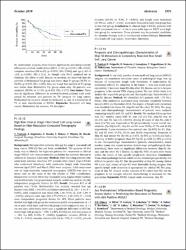| dc.contributor.author | Ölmez, Ömer Fatih | |
| dc.contributor.author | Bilici, Ahmet | |
| dc.contributor.author | Gürsoy, Pınar | |
| dc.contributor.author | Çubukçu, Erdem | |
| dc.contributor.author | Yıldız, Özcan | |
| dc.contributor.author | Sakın, Abdullah | |
| dc.contributor.author | Korkmaz, Taner | |
| dc.contributor.author | Çil, İbrahim | |
| dc.contributor.author | Çakar, Beyhan | |
| dc.contributor.author | Menekşe, Serkan | |
| dc.contributor.author | Demir, Tarık | |
| dc.contributor.author | Açıkgöz, Özgen | |
| dc.contributor.author | Hamdard, Jamshid | |
| dc.date.accessioned | 2019-12-25T07:29:26Z | |
| dc.date.available | 2019-12-25T07:29:26Z | |
| dc.date.issued | 2019 | en_US |
| dc.identifier.citation | Ölmez, Ö. F., Bilici, A., Gürsoy, P.,Çubukcu, E., Yıldız, Ö., Sakın, A. ... Hamdard, J. (2019). Are pretreatment inflammation-based prognostic scores useful in predicting the outcomes of patients with ALK-positive NSCLC? Journal of Thoracic Oncology içinde (551-552. ss.). Elsevier Science. https://doi.org/10.1016/j.jtho.2019.08.1152 | en_US |
| dc.identifier.issn | 1556-1380 | |
| dc.identifier.issn | 1556-0864 | |
| dc.identifier.uri | https://doi.org/10.1016/j.jtho.2019.08.1152 | |
| dc.identifier.uri | https://hdl.handle.net/20.500.12511/4667 | |
| dc.description.abstract | Background: Approximately 5% of all diagnosed non-small cell lung cancer (NSCLC) patients harbor a genetic rearrangement between the ALK and EML4 genes, representing a specific molecular and clinical subgroup (ALK+ NSCLC). To date, upfront treatment with ALK-tyrosine-kinase inhibitors (ALK-TKIs) has replaced chemotherapy in the first line setting for this subset of patients with excellent results, but reliable prognostic markers are lacking. An increased systemic inflammatory response has been shown to be associated with a poor prognosis, and some of the parameters used to characterize this response can easily be measured in clinical practice in several tumor types, but have not been analyzed extensively in ALK+ lung cancer in the era of crizotinib. Method: We reviewed the medical records of all patients with previously treated advanced ALK-positive NSCLC who received crizotinib between January 2013 and March 2018 outside of a clinical trial. Pre-treatment modified Glasgow prognostic score (mGPS), Prognostic Nutritional Index (PNI) and Systemic immune-inflammation index (SII) were calculated. Multivariable logistic regression and Cox proportional hazards models were used to assess the impact of pretreatment mGPS, PNI and SII on overall survival (OS), progression-free survival (PFS), and overall response rate (ORR). Result: 82 patients were treated. Median age was 52.5 years (range; 20e77 years); 42.7% were female. Eighty-four point two percent of patients had an Eastern Cooperative Oncology Group Performance Status (ECOG PS) 1; 17.1% had received 2 prior systemic therapies. The objective response rate was 77.2% (CR+PR). The optimal cutoff levels were 0.09 for mGPS and PNI, 934.7 for SII by ROC curves analysis. Patients in the SII 934.7 grous was significantly correlated with worse PFS and OS by univariate analysis (Figure 1). In multivariate analyses, pretreatment prognostic nutritional index (PNI) 0.09 was independently associated with inferior OS (1 year OS rates, 90.2% vs. 73.7%; HR 2.46, 95% CI 0.88- 4.85; p ¼ 0.035). Additionally, we evaluated the effects of these markers on response prediction. The logistic regression analysis of the predictive factors for the response to crizotinib demonstrated that the mGPS and PNI were associated with inferior ORR (OR: 0.1, 95% CI 0.16-1.04; p ¼ 0.009 and OR: 0.16, 95% CI 0.02-0.55; p ¼ 0.035, respectively). Conclusion: In a cohort of patients with ALK positive NSCLC treated with crizotinib in routine practice, elevated pre-treatment SII was associated with shorter OS and PFS in univariate analysis and PNI was associated with shorter OS in multivariate analyses. Moreover the mGPS and PNI were associated with lower response rates. | en_US |
| dc.language.iso | eng | en_US |
| dc.publisher | Elsevier Science | en_US |
| dc.rights | info:eu-repo/semantics/openAccess | en_US |
| dc.subject | Inflammation-Based Prognostic Scores | en_US |
| dc.subject | Non Small Cell Lung Cancer | en_US |
| dc.subject | Anaplastic Lymphoma Kinase | en_US |
| dc.title | Are pretreatment inflammation-based prognostic scores useful in predicting the outcomes of patients with ALK-positive NSCLC? | en_US |
| dc.type | conferenceObject | en_US |
| dc.relation.ispartof | Journal of Thoracic Oncology | en_US |
| dc.department | İstanbul Medipol Üniversitesi, Tıp Fakültesi, Dahili Tıp Bilimleri Bölümü, İç Hastalıkları Ana Bilim Dalı | en_US |
| dc.authorid | 0000-0002-5823-1704 | en_US |
| dc.identifier.volume | 14 | en_US |
| dc.identifier.issue | 10 | en_US |
| dc.identifier.startpage | 551 | en_US |
| dc.identifier.endpage | 552 | en_US |
| dc.relation.publicationcategory | Konferans Öğesi - Uluslararası - Kurum Öğretim Elemanı | en_US |
| dc.identifier.doi | 10.1016/j.jtho.2019.08.1152 | en_US |
| dc.identifier.wosquality | Q1 | en_US |


















